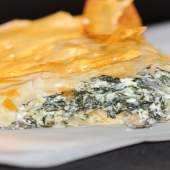Steak, Mexican, and Greek on the Menu This Week
This week on Check, Please! our guest reviewers take us out for huge portions and excellent service at Mastro's Steakhouse, kosher-style Mexican fare at La Casa De Isaac, and authentic Greek cuisine and spit-roasted meats at Melanthios Greek Char House. Once again, Check, Please! delivers an eclectic mix of food styles, as well as guests this week!
I think guest reviewer Marti Berkowitz did it up right at Mastro's. As it's a steakhouse – and the meats are the stars of the show – Marti took on the true task of any good restaurant reviewer by trying almost every appetizer and side she could order to provide a thorough assessment of her experience. Kudos Marti! Way to take one for the team! Needless to say, she loved the experience. The portions are generous, and all of our guest reviewers agreed with reviewer Jeremy – the meal, service, and atmosphere at Mastro's are top notch.
Guest reviewer Miguel de Baca had our reviewers venture out to Highland Park for what many people might consider a new twist on Mexican cuisine. While it only makes sense that in every culture there are varying traditions, it is not typical to think of Mexican food prepared in…kosher-style? Owner Isaac Nava is a Mexican Jew and uses recipes handed down in his family from generation to generation. Nava explains that the dishes are prepared in "kosher-style," eliminating the use of shellfish and pork, and traditional Mexican dishes like quesadillas are given a kosher twist. For example, King David's Quesadillas are made with lox, cream cheese and onions. Reviewer Marti found that this style of cooking might reduce the spicy-heat that is often found in Mexican cuisine, which makes for milder flavors. In accordance with Jewish law, Nava also closes his restaurant on Fridays at sundown until Saturday at sundown so, if you're planning a visit, you may want to call to confirm the hours of operation.
This restaurant selection encouraged me to learn more about the meaning of "kosher." I did a little research and found an online encyclopedia of Judaism called "Judaism 101," which explains kosher in basic terms. It explains that Kashrut is the Jewish law related to foods that can or cannot be eaten. Kashrut is derived from the Torah, the first five books of the Bible that contain Jewish teachings. Kosher describes food that meets the standards of the Jewish law. People keeping kosher observe these laws year-round, not just on high-holidays like Passover. Kosher for Passover is different than kosher for year-round. Kosher food is not simply "blessed" by a rabbi but, rather, butchered or prepared in certain ways. For example, acceptable meat products are kept and prepared separately from dairy products. Kosher kitchens typically have separate dishes and cookware for these items. The laws state that certain animals — pigs, for example –are never to be eaten. The law includes any part of the animal, its eggs, and/or milk. According to this website, "kosher-style" doesn't necessarily mean that the food is prepared kosher, but that traditional Jewish foods may be served.
Finally Marti introduced us to Melanthios Greek Char House and we found that our table was filled with Greek food aficionados! Miguel's brother lives in Greece and having visited many times, he knows moussaka (layered eggplant, potato, and meat topped with béchamel sauce and baked)t and raved about the moussaka at Melanthios. Jeremy's wife is Greek and brought her Greek family along to dinner, and they raved about their meal as well. It's fantastic luck when we bring together three very different people, and a common thread links them together in some way. Of course there's the love of food but in this show we discovered that each of our guests has a "Greek" connection!
Happy Eating!
Carmen M. Schmidt
Associate Producer, Check, Please!
WTTW





